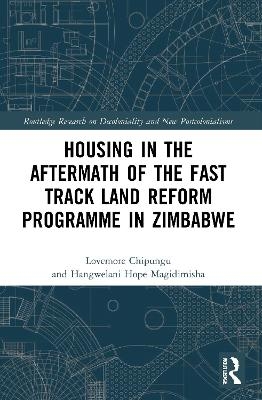
Housing in the Aftermath of the Fast Track Land Reform Programme in Zimbabwe
Routledge (Verlag)
978-0-367-65451-1 (ISBN)
Prior to the FTLRP, the Zimbabwean governments had never embraced popular modes of housing production as key factors in urban development. In the area of low-income housing, informal housing schemes have always been treated with apathy and indifference. This left the conventional mode of housing production to be the only legitimate means to house low-income households despite its shortcomings. However, the onset of the FTLRP in 2000 resulted in homeless urban households grasping the opportunity to invade farms for housing development. Through the lenses of Marxism and Neoliberalism, this book analyses housing schemes that emerged and the overall impact of the FTLRP on housing and land delivery in Harare. This analysis is based on empirical evidence obtained from key informants and household surveys conducted in Harare. The authors argue that the FTLRP provided a platform for innovativeness by households, supported by the unpronounced national urban vision and prowess of the political leadership. Hence the success of these housing schemes can be measured by acquisition of land which guarantees households access to the city. However, some of these housing schemes pose challenges – key among them being lack of infrastructure.
The book concludes by presenting a new model for effective delivery of land and housing for the urban poor. This is envisaged as a useful policy tool for urban planners, housing experts, land economists, urban and regional geographers, as well as sociologists, political scientists and social workers engaged in public administration of land and housing.
Lovemore Chipungu is a senior lecturer in the School of the Built Environment and Development Studies at the University of KwaZulu-Natal. His areas of research are low income housing, housing policy, urban land and urban design. He has published widely through books and journal articles Hangwelani Hope Magidimisha is a Professor in the Housing and Town Planning cluster in the School of the Built Environment and Development Studies at the University of KwaZulu-Natal. She is also a SARCHi-Chair for Inclusive Cities whose interest is in spatial inequality and inclusivity of cities.
Part 1: Land Reform and Housing – An Overview 1. Dichotomies of an African City: Insight into Land for Housing 2. The State and Urban Development – A Theoretical Retreat 3. Land Reform and Housing Development – An International Perspective 4. Methodology Part 2: Unpacking Housing Developments in the Wake of the Fast Track Land Reform Programme 5. Creating a Gentlemen’s City in Colonial Zimbabwe (1890 – 1980) 6. Harare – Diagnosing the Institutional Framework for Land and Housing Development in Post-colonial Zimbabwe (1980-1999) 7. Insight into the FTLRP in Zimbabwe – An Overview 8. Claiming Housing Rights to the City through Mass Movements 9. The Politics of Land and Housing Development in Harare 10. The FTLRP and Housing Infrastructure Development 11. Redefining Housing Perceptions in the Aftermath of the FTLRP 12. The Dynamic Model for Land and Housing Development 13. Deconstructing the Myth on Land and Housing during the FTLRP - Concluding Remarks
| Erscheinungsdatum | 20.07.2023 |
|---|---|
| Reihe/Serie | Routledge Research on Decoloniality and New Postcolonialisms |
| Zusatzinfo | 15 Tables, black and white; 15 Line drawings, black and white; 10 Halftones, black and white; 25 Illustrations, black and white |
| Verlagsort | London |
| Sprache | englisch |
| Maße | 156 x 234 mm |
| Gewicht | 399 g |
| Themenwelt | Naturwissenschaften ► Geowissenschaften ► Geografie / Kartografie |
| Sozialwissenschaften ► Politik / Verwaltung ► Vergleichende Politikwissenschaften | |
| Sozialwissenschaften ► Soziologie ► Spezielle Soziologien | |
| ISBN-10 | 0-367-65451-2 / 0367654512 |
| ISBN-13 | 978-0-367-65451-1 / 9780367654511 |
| Zustand | Neuware |
| Informationen gemäß Produktsicherheitsverordnung (GPSR) | |
| Haben Sie eine Frage zum Produkt? |
aus dem Bereich


